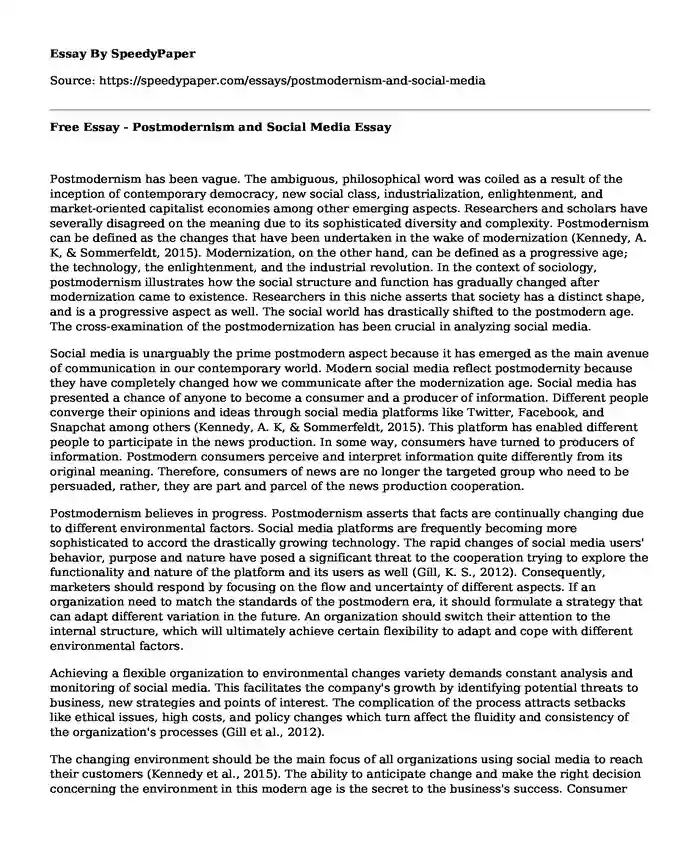
| Type of paper: | Essay |
| Categories: | Marketing Philosophy Social media Public relations |
| Pages: | 3 |
| Wordcount: | 668 words |
Postmodernism has been vague. The ambiguous, philosophical word was coiled as a result of the inception of contemporary democracy, new social class, industrialization, enlightenment, and market-oriented capitalist economies among other emerging aspects. Researchers and scholars have severally disagreed on the meaning due to its sophisticated diversity and complexity. Postmodernism can be defined as the changes that have been undertaken in the wake of modernization (Kennedy, A. K, & Sommerfeldt, 2015). Modernization, on the other hand, can be defined as a progressive age; the technology, the enlightenment, and the industrial revolution. In the context of sociology, postmodernism illustrates how the social structure and function has gradually changed after modernization came to existence. Researchers in this niche asserts that society has a distinct shape, and is a progressive aspect as well. The social world has drastically shifted to the postmodern age. The cross-examination of the postmodernization has been crucial in analyzing social media.
Social media is unarguably the prime postmodern aspect because it has emerged as the main avenue of communication in our contemporary world. Modern social media reflect postmodernity because they have completely changed how we communicate after the modernization age. Social media has presented a chance of anyone to become a consumer and a producer of information. Different people converge their opinions and ideas through social media platforms like Twitter, Facebook, and Snapchat among others (Kennedy, A. K, & Sommerfeldt, 2015). This platform has enabled different people to participate in the news production. In some way, consumers have turned to producers of information. Postmodern consumers perceive and interpret information quite differently from its original meaning. Therefore, consumers of news are no longer the targeted group who need to be persuaded, rather, they are part and parcel of the news production cooperation.
Postmodernism believes in progress. Postmodernism asserts that facts are continually changing due to different environmental factors. Social media platforms are frequently becoming more sophisticated to accord the drastically growing technology. The rapid changes of social media users' behavior, purpose and nature have posed a significant threat to the cooperation trying to explore the functionality and nature of the platform and its users as well (Gill, K. S., 2012). Consequently, marketers should respond by focusing on the flow and uncertainty of different aspects. If an organization need to match the standards of the postmodern era, it should formulate a strategy that can adapt different variation in the future. An organization should switch their attention to the internal structure, which will ultimately achieve certain flexibility to adapt and cope with different environmental factors.
Achieving a flexible organization to environmental changes variety demands constant analysis and monitoring of social media. This facilitates the company's growth by identifying potential threats to business, new strategies and points of interest. The complication of the process attracts setbacks like ethical issues, high costs, and policy changes which turn affect the fluidity and consistency of the organization's processes (Gill et al., 2012).
The changing environment should be the main focus of all organizations using social media to reach their customers (Kennedy et al., 2015). The ability to anticipate change and make the right decision concerning the environment in this modern age is the secret to the business's success. Consumer engagement is crucial in the contemporary world. Postmodernism depicts communication as a process, but not an event. It is a process of constructing, analyzing and disseminating the information to the user. The opportunities offered in Social media can only be achieved if due process is followed in executing the process. Marketers can attain business success if postmodernism characteristics of social media are well-considered. Being receptive and flexible can play a major rule in the company's adoption of new changes and varieties. Conclusively, evaluating, observing and cross-examination on social media demand flexibility and the ability to anticipate change.
References
Kennedy, A. K., & Sommerfeldt, E. J. (2015). A postmodern turn for social media research: Theory and research directions for public relations scholarship. Atlantic Journal of Communication, 23(1), 31-45.
Gill, K. S. (Ed.). (2012). Information society: New media, ethics, and postmodernism. Springer Science & Business Media.
Cite this page
Free Essay - Postmodernism and Social Media. (2023, Mar 21). Retrieved from https://speedypaper.com/essays/postmodernism-and-social-media
Request Removal
If you are the original author of this essay and no longer wish to have it published on the SpeedyPaper website, please click below to request its removal:
- Abortion Should Be Legal - Free Essay Example
- Essay Example: Deep Learning for the Internet of Things with Edge Computing
- Essay Example on Benefits for Not Building the Border Wall
- Free Essay Example: The Hamlet Analysis
- Paper Sample on Problem Solving: Lynn and Mark Case
- Free Essay. "Don't Be a Sucker" By the US War Department.
- Why Vaccines Should be Mandatory - Essay Sample
Popular categories




